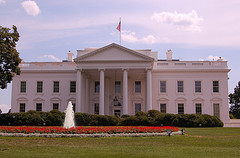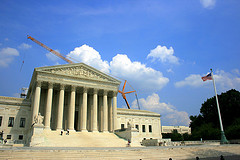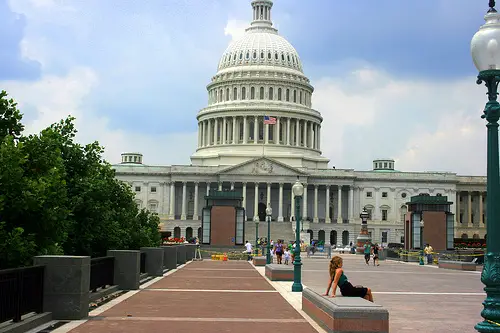The 3 branches were designed for two reasons. Mainly, balance of power. No one branch or function or government has total power, and can be contained by one or both of the other branches. The other reason is representation. The House of Representatives represents the people (the peoples House), the Senate represents the states, the Supreme Court represents the constitution and rights of the minority, the executive branch represents the nation as a whole.
Each branch has their owns specific duty and all three together makes a strong united democracy
The words that he was looking for were "division of power," not balance of power . . . A term used in association with international affairs between nations. Nor was the institution of a three branch government about making a strong, united, goverment - democracy or otherwise; in fact quite the opposite. As suggested by Gosam777, by dividing powers (those reserved to government and not to the people) among three branches, none of which can function without some form of consent by the others, any excesses of government are hoped to be prevented by a competing branches of government exercising their constitutionally derived powers. Thus, for example, the legislature, which has sole authority to enact law for the raising of revenue and funding of government (both itself and the other branches) can use the "power of the purse" to curtail what it deems to be excesses by the executive branch. The Judicial in exercising its authority to interpret the meaning of law intended by Congress, can rule on the constitutionality, even striking down some acts of the Congress. These are but a few examples. The way envisioned by the founders for the functioning of goverment without compromising or sacrificing the liberties of the people (something people often erroneously equate with democracy) was not that goverment should be united and strong as Aimee suggests but, rather, that it should be divided, fractious, and weak in the sense of being limited in its powers. The constitutional framework by which the founders sought to define powers while limiting them at the same time was via the reserved powers clause. By this it was said that those powers granted to the Federal goverment and its brances were reserved to the Federal government (branches); and, in turn, those not reserved by the Federal Goverment were reserved to the states; and, after that, all power (not reserved to the national or state goverments was reserved and could be exercised by the people at large. The three branch divison of goverment was not about representaton, as the Congress is the only representative branch. Nor is a representative branch like Congress about Democracy . . But rather only about the semblance of Democracy . . . In that, through the franchise the people have some measure of control/power, but not democratic power, over their representatives in the enactment of law. In a true democracy such as in ancient Athens or in town meetings of New England, enactment of law/ordinances was/is by direct vote. (Some US states have forms of direct enactment called referenda, but most do not.) Neither the Executive nor the Judicial Branches are representative branches in the performance of their constitutional powers. The executive is generally charged with carrying out and enforcing the mandates of Congress, including the independent supervision of the military and naval forces, it's only representative feature being that the chief executive officers, the President and Vice President are elected and placed in offiice and can be replaced in office (only) every four years. The Judicial branch of the US is a largely independent branch in that justices are not voted on and Supreme Court justices (by advice and consent of Congress) serve a term of life. The Judiciary does not represent anyone other that the Constitution (which is the surpreme law of the land) including minoritiies. It can only provide relief or protection against what it deems to be breaches of the constitution, whether by Congress, the Executive, or the states at large. A more fitting term to describe the three-branch, US form of government is Republic . . . Or, a rebublican form of goverment. (The terms republican and democratic should not be equated or confused with the political parties by the same names.) The US has a republican form of government because the Constitution requires the US to be a republic. While it is important to understand how the three branch US government (and similarly structured state government) serves the interests of democratic-like rule, it is equally important to realize that other forms of government are of "democracies" as well, some even moreso than the U.S. In some ways. The idea of division of powers does, however, appear as a recurring theme in most if not all govermnents calling themselves democratic.



